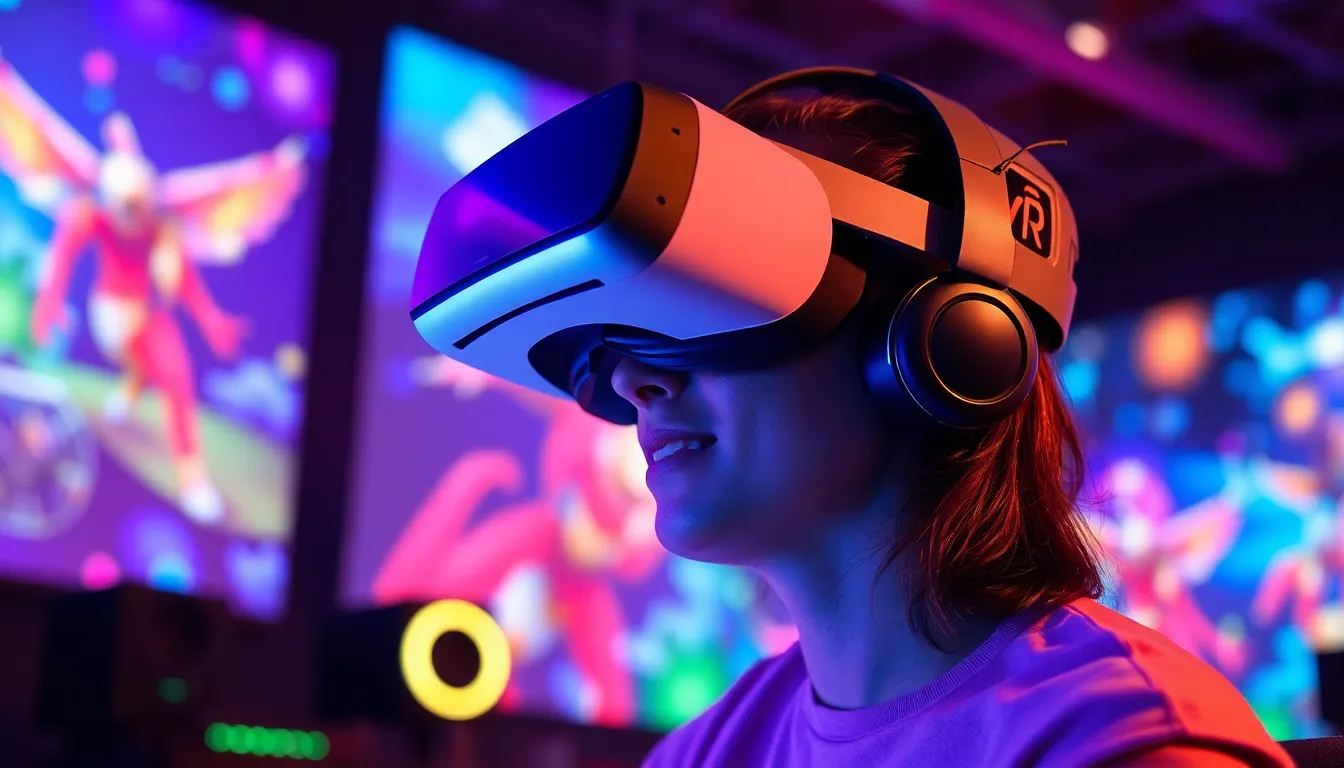In a world where reality can sometimes feel a bit too mundane, virtual reality swoops in like a superhero, ready to whisk gamers away to fantastical realms. With the best virtual reality game systems, players can battle dragons, explore alien planets, or even dance like nobody’s watching—because, let’s be honest, nobody is!
Choosing the right VR system can feel like trying to find a needle in a haystack, but fear not! This guide will help navigate the dizzying array of options, ensuring you don’t end up with a headset that’s more headache than happiness. Whether you’re a casual gamer or a hardcore enthusiast, the perfect virtual reality experience is just around the corner, waiting to turn your living room into a portal of endless adventures.
Table of Contents
ToggleOverview of Virtual Reality Game Systems
Virtual reality game systems offer immersive experiences for players in various gaming environments. Several major platforms provide distinct features and capabilities, catering to a range of gaming preferences. Oculus, PlayStation VR, and HTC Vive remain among the most recognized systems in the market.
Oculus Quest 2 provides a standalone experience, eliminating the need for external hardware. This system boasts a library of over 100 games, including popular titles like Beat Saber and Vader Immortal. An intuitive interface enhances accessibility for casual gamers and enthusiasts alike.
PlayStation VR connects with PlayStation consoles, offering strong exclusives such as Astro Bot Rescue Mission. Its user-friendly design appeals to players familiar with console gaming. Advanced motion tracking and comfortable ergonomics further enhance the gameplay experience.
HTC Vive targets dedicated gamers seeking high-quality visuals and precise tracking. Room-scale VR capabilities allow expansive movement in virtual environments. With options like Vive Pro, players can invest in enhanced audio and visual quality, making it a strong contender for serious VR enthusiasts.
Additional options also fill the ecosystem. Valve Index offers impressive refresh rates and high-fidelity visuals, though it requires extensive setup and PC compatibility. Windows Mixed Reality systems cater to budget-conscious gamers, providing fundamental VR experiences without sacrificing quality.
The diversity of virtual reality game systems ensures something for everyone. Each option balances performance, accessibility, and content availability, making it easier for players to find their ideal setup. As technology continues to advance, the possibilities within virtual reality gaming will likely expand, offering even more engaging experiences.
Criteria for Selection

Selecting the best virtual reality game system involves several key factors that can enhance the overall gaming experience. Performance and graphics, game library, and user experience stand out as crucial considerations.
Performance and Graphics
Performance and graphics greatly influence the quality of virtual reality gaming. High refresh rates minimize motion blur, ensuring smoother visuals. Systems like the HTC Vive excel in delivering stunning graphics with expansive field of view. In contrast, the Oculus Quest 2 offers impressive performance in a standalone setup. Frame rates that reach 90 Hz contribute to immersive experiences. Therefore, users should prioritize systems that provide both high resolution and consistent performance.
Game Library
A rich game library is essential for any successful VR system. Players find joy in the variety and quality of available titles. The Oculus Quest 2 boasts over 100 games, including popular titles like Beat Saber. PlayStation VR features strong exclusives that appeal to console gamers, such as Astro Bot Rescue Mission. Users should look for systems that offer diverse genres, catering to both casual and hardcore gamers. Availability of new releases also plays a significant role, keeping the gaming experience fresh and exciting.
User Experience
User experience encompasses comfort and ease of use. Systems that offer adjustable head straps and ergonomic controllers enhance gameplay. The simplicity of setup is another factor; for instance, the Oculus Quest 2 requires minimal external hardware. Furthermore, intuitive menus and controls enable players to dive right into gaming. Ensuring that ease of access accommodates different skill levels helps maintain long-term engagement. Thus, prioritizing user experience contributes to an enjoyable VR adventure.
Top Contenders for Best Virtual Reality Game System
Selecting the best virtual reality game system involves considering several top contenders, each offering unique features and benefits.
System 1: Oculus Quest 2 Features and Benefits
Oculus Quest 2 provides a standalone experience without the need for external hardware. Its library boasts over 100 games, catering to various preferences in gaming genres. Players appreciate the high-resolution display, delivering striking visuals with a refresh rate of up to 120 Hz. The ease of setup allows immediate access to immersive experiences, making it ideal for casual gamers. Strong community support enhances user engagement, encouraging social interactions within virtual spaces. Overall, its balance of performance and accessibility positions the Oculus Quest 2 as a leading option for VR enthusiasts.
System 2: PlayStation VR Features and Benefits
PlayStation VR connects seamlessly to PlayStation consoles, offering a robust array of exclusive titles. Gamers enjoy its user-friendly design, ensuring accessibility for beginners and experienced players. The system includes several accessories, enhancing interactivity in games. With a comfortable headset design, extended play sessions become more enjoyable. High-quality graphics pair with captivating storytelling, engaging players deeply within game narratives. PlayStation VR’s combination of rich content and strong performance makes it an excellent choice for console-based VR gaming.
System 3: HTC Vive Features and Benefits
HTC Vive targets dedicated gamers seeking a premium virtual reality experience. The system’s high-quality visuals captivate users, delivering stunning graphics that immerse players in diverse environments. Room-scale tracking offers users freedom to move around, enhancing gameplay experiences in expansive areas. Additionally, the inclusion of high-fidelity audio elevates the overall sensory experience. Support for a wide range of VR content ensures players access to both popular and niche titles. HTC Vive’s focus on performance and immersion makes it a top contender for serious VR gamers.
User Reviews and Feedback
User reviews highlight the strengths and weaknesses of various virtual reality game systems. Players appreciate the Oculus Quest 2 for its standalone functionality, allowing them to experience VR without a PC or console. Many comment on the high-resolution display that enhances immersion, and community support improves user engagement. Positive feedback often focuses on the extensive library of titles, which caters to diverse gaming preferences.
PlayStation VR garners praise for its simplicity and seamless integration with consoles. Gamers enjoy accessing exclusive titles that enhance the overall experience. Reviewers frequently mention the comfort and intuitiveness of the setup, making it a favored choice for newcomers.
HTC Vive receives accolades for delivering a premium experience that emphasizes high-quality visuals and audio. Users often express their satisfaction with the room-scale tracking, which allows for freedom of movement during gameplay. Serious gamers seeking immersion value the sophisticated technology that drives the system.
Valve Index attracts a dedicated fan base as well. Reviews reflect enthusiasm for the high refresh rates and precise tracking features. Players comment on the advanced controllers that provide tactile feedback, enhancing the realism of gameplay.
In contrast, Windows Mixed Reality systems sometimes face criticism regarding limited game titles available. Users express concerns about compatibility issues and require more exclusive content for a satisfactory experience. Feedback regarding comfort varies, with some users stating the headsets could improve fit and usability.
Each system’s reviews illustrate a clear trend: players prioritize immersive experiences, a strong library of games, and comfort across all virtual reality platforms. These factors play critical roles in shaping user satisfaction and ultimately influence purchasing decisions.
Choosing the best virtual reality game system can transform gaming experiences and open up new worlds of adventure. With a variety of options available each catering to different preferences and budgets, players can find a system that fits their needs perfectly. Whether it’s the standalone convenience of the Oculus Quest 2 the console integration of PlayStation VR or the premium experience offered by HTC Vive there’s something for everyone.
As technology continues to evolve the future of VR gaming looks promising with even more immersive and engaging experiences on the horizon. By considering performance graphics and user experience players can confidently select a VR system that will elevate their gaming to new heights. Embracing virtual reality is not just about playing games; it’s about stepping into a whole new dimension of entertainment.




